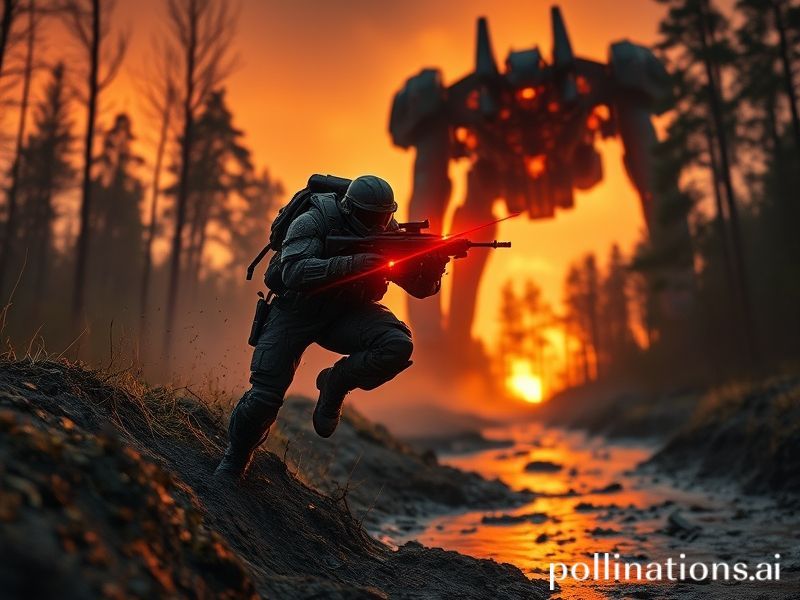Helldivers 2: How a Swedish Bug-Shooter Became the World’s Most Honest Foreign-Policy Simulator
The Planet’s Newest Theater of War Is a Pixelated One
A dispatch from the frontlines of Helldivers 2, where democracy is delivered 120 fps at a time
By our man in the cheap seats, watching the world burn on a 4K monitor
GENEVA—While the Security Council bickers over commas, a different multilateral coalition has spent the spring perfecting the art of synchronized orbital bombardment. From Lagos living rooms to Seoul PC bangs, some twelve million registered “Helldivers” have logged on to Arrowhead Game Studios’ Helldivers 2, a cooperative third-person shooter that asks the age-old question: what if NATO’s PowerPoint slides were weaponized and dropped on giant alien bugs?
The game’s premise is comfort-food simple: Super Earth—basically Costco with orbital elevators—declares that “managed democracy” must be exported to the farthest corners of the galaxy. Players, clad in armor that looks like a Tesla had a baby with a vending machine, oblige by carpet-bombing entire biomes while chanting patriotic one-liners written by the same committee that names Elon Musk’s children. It’s Starship Troopers without the subtlety, which is to say it’s the most honest foreign-policy simulator on the market.
Global appeal, local collateral
Within three weeks of release, Helldivers 2 became Sony’s fastest-selling PC title ever, proving that nothing unites humanity quite like the opportunity to accidentally airstrike your friends. Steam charts show concurrent users spiking at 450,000—roughly the population of Bratislava, except better armed and slightly more cooperative. Japanese streamers speed-run “defend the drill” missions in under four minutes; Brazilian squads role-play as off-duty police, complete with Portuguese profanity; German clans insist on pre-mission risk assessments, because of course they do.
The economic ripple is measurable. Graphics-card prices in India jumped 18 percent overnight as miners abandoned crypto for bug dust. In Poland, where the developer is based, the zloty strengthened on rumors that “democracy delivery” would be added to export statistics. Meanwhile, U.S. congressmen who still think TikTok is a clock have begun asking briefers whether “that Swedish space game” could be repurposed for recruitment. The Pentagon already has a PowerPoint, naturally.
Diplomacy, reloaded
The game’s live “Galactic War” map is a Rorschach test for every geopolitical neurosis. When Chinese players organized a 48-hour blitz to liberate the planet Malevelon Creek, Western Redditors accused them of botting, echoing every trade-war allegation since 2001. Turkey temporarily banned Twitch streams after a Kurdish-language squad named a planet “Kobane.” And in an only-in-2024 moment, the Ukrainian ministry of defense tweeted gameplay footage with the caption “This is what de-occupation looks like,” prompting Russian state media to counter that the bugs are obviously NATO-backed biolabs.
All of which delights Johan Pilestedt, Arrowhead’s CEO, who told me over Discord (avatar: a smiling mushroom cloud) that he “just wanted to make a game where cooperation matters.” Mission half-accomplished: players cooperate beautifully until the supply crate drops short and someone gets flattened by “freedom.” Then the chat log resembles every UN climate summit—lots of blame, zero accountability, and someone’s definitely getting nuked.
The human condition, now with ray tracing
Psychologists call the phenomenon “benign disinhibition”: the same neurological loophole that lets people open up to chatbots allows them to laugh while calling in a 500-kiloton Hellbomb on a teammate who voted for the wrong stratagem. It’s also why, in the middle of a cost-of-living crisis, gamers will happily pay $9.99 for a “Super Earth Loyalty Pack” that includes nothing tangible except a gold helmet and the fleeting illusion of social mobility.
Yet beneath the snark lies a bleak recognition. Helldivers 2 works because it mirrors the absurdities we already accept: forever wars fought for vague ideals, friendly-fire incidents rebranded as “kinetic misunderstandings,” and the cheerful outsourcing of civic duty to private contractors who invoice by the body bag. The only difference is that in the game, the bugs don’t file war-crime reports.
Final transmission
By the time you read this, Super Earth will have “liberated” another dozen planets, the servers will have crashed at least twice, and someone in Manila will have unlocked the achievement for accidentally killing their entire squad with a misplaced napalm strike—an act the game labels “democracy in action.” Peace, it turns out, was never an option; it doesn’t stream well.
So lock and load, citizen. The galaxy is vast, the bugs are numerous, and the only thing we still agree on—left, right, east, west—is that blowing up aliens together beats watching the news. Just remember: when the orbital beacon lands short, duck. And if you survive, file a complaint with the same institutions that promised you transparency, accountability, and a 60-fps lock. They’re open 24/7, somewhere between the loading screen and the next inevitable war.







